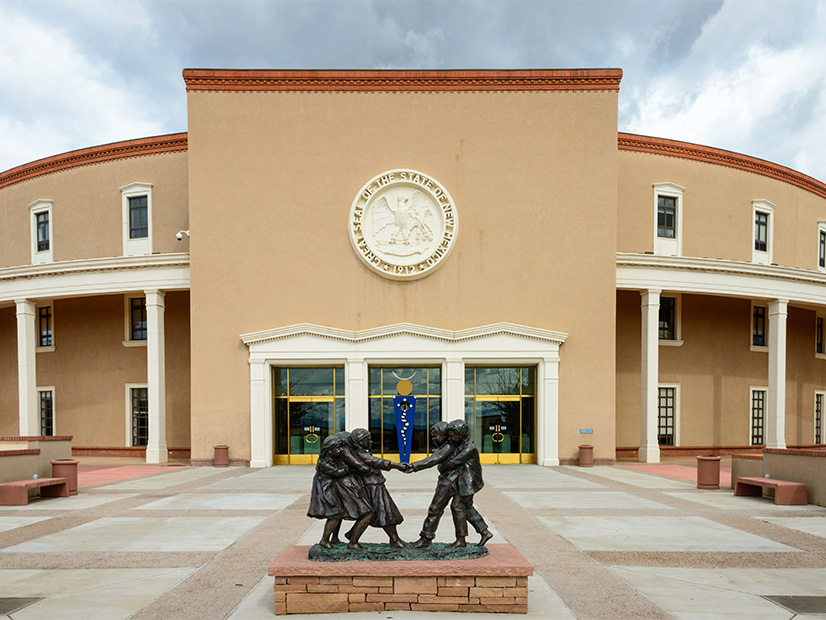A bill that would have set a goal of net zero greenhouse gas emissions by 2050 has failed in the New Mexico Legislature, but proponents expect some version of the proposal to return next year.
State lawmakers also rejected a proposed low-carbon fuel standard and a hydrogen hub development act during the 2022 session, which ended on Feb. 17.
The state legislature holds a 30-day session in even-numbered years to focus on the budget, as well as bills in priority areas identified by the governor.
During a climate conference in October, Democratic Gov. Michelle Lujan Grisham committed to backing net-zero legislation, a hydrogen hub act and a clean-fuel standard in the 2022 session.
Rep. Nathan Small (D) introduced the net-zero proposal (HB6, also known as the Clean Future Act), which would have mandated a reduction in statewide greenhouse gas emissions to 50% of 2005 levels by 2030. The reduction would have been in “direct” emissions, without the use of offsets.
By 2050, the bill would have required a 90% reduction in direct GHG emissions with remaining emissions “at least matched” with offsets “generated by biological, technological, chemical, or geologic means” to achieve at least net-zero emissions.
The bill stalled after the House Government, Elections and Indian Affairs Committee voted on Feb. 11 to recommend a substitution for HB6.
The Sierra Club Rio Grande Chapter called the Clean Future Act’s failure a “disappointing outcome.” In a release, the group said the New Mexico Oil and Gas Association spent more than $256,000 on advertising against the bill in the final weeks of the legislative session.
Chapter Director Camilla Feibelman said previously that the proposal’s 50% direct reduction in GHG emissions by 2030 would be more ambitious than the 45% reduction that the governor set as a 2030 target in 2019. (See New Mexico Draft Bill Targets Net Zero by 2050.)
Alex DeGolia, director of state legislative and regulatory affairs for the Environmental Defense Fund, said the group plans to build on the momentum generated for the Clean Future Act during this year’s session to pursue similar legislation in 2023. Next year, state lawmakers will meet for a 60-day, rather than 30-day, session.
DeGolia said the 2030 target of cutting GHG emissions by half is particularly important. “Action sooner than later is essential.”
Clean-Fuel Bill Dies
Environmental groups were also disappointed with the failure of Sen. Mimi Stewart’s (D) SB14, the proposed Clean Fuel Standard Act, which would have directed the state Environmental Improvement Board to adopt rules to decrease the carbon intensity of transportation fuels. It would have created a system of credits that fuel producers could use to meet annual targets.
The bill said New Mexico could coordinate with states that have adopted a similar standard, such as California.
The Democrat-controlled Senate passed the bill on a 25-16 vote, but it died on a 33-33 vote on the last day of the session in the House, which Democrats control 45-24-1.
Hydrogen Controversy
Another bill that failed was HB4, the Hydrogen Hub Development Act introduced by Rep. Patricia Lundstrom (D). The bill would have established grant and loan programs for hydrogen hub projects, offered tax incentives for developing hydrogen facilities and authorized public-private partnerships.
The House Energy, Environment and Natural Resources Committee tabled HB4 on a 6-4 vote. But the proposal resurfaced when Lundstrom incorporated a revised version of the measure into a generic bill, HB227, the Albuquerque Journal reported. The bill was referred to the House Appropriations and Finance Committee, which Lundstrom chairs.
House Speaker Brian Egolf (D) reportedly pulled HB227 from committee, and the bill died.
The hydrogen bills had faced criticism from groups, including Pueblo Action Alliance and Youth United for Climate Crisis Action, which said the proposals “prioritize[d] investments in a fossil-fuel based technology to secure fossil fuel interests.”
“Hydrogen is not a ‘clean’ energy nor is it renewable,” the groups said in a release. “Hydrogen production is resource intensive and would impact our water resources.”
Lujan Grisham hasn’t abandoned the idea of New Mexico as a hydrogen hub, however. Last week, she joined the governors of Colorado, Utah and Wyoming in announcing that the four states would team up to develop a Western Inter-States Hydrogen Hub with facilities in each state. (See Mountain States Partner to Secure Hydrogen Hub.)
Efficiency Program Approved
Lujan Grisham did get to sign one bill, HB37, legislation creating a community energy efficiency block grant program in the state’s Energy, Minerals and Natural Resources Department. The bill passed the House 44-24 and the Senate 26-14.
HB37 is intended to reduce the energy burdens faced by low-income residents. People living below the poverty line spend 15% of their income on average to pay their energy bills, according to the Southwest Energy Efficiency Project (SWEEP), which supported the bill.
Lawmakers approved a $10 million appropriation to the program.
“It’s wonderful to see prioritization of resources to help low-income New Mexicans reduce their energy burdens while creating good-paying local jobs and fighting climate change,” Tammy Fiebelkorn, SWEEP’s New Mexico representative, said in a statement.




